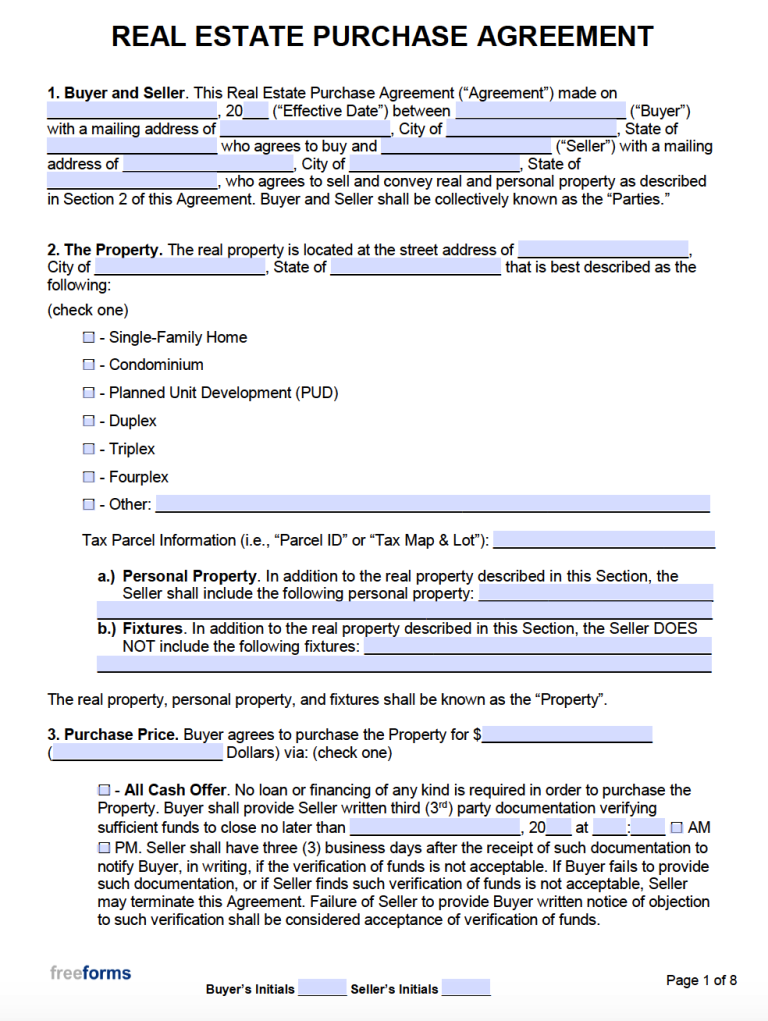
A purchase agreement is most commonly used to create a transaction between a buyer and a seller of residential real estate. It will outline the final negotiations between the parties, including the sales price, contingencies, and when the closing must occur.
Last updated September 21st, 2024
A purchase agreement is most commonly used to create a transaction between a buyer and a seller of residential real estate. It will outline the final negotiations between the parties, including the sales price, contingencies, and when the closing must occur.
4.6 | 379 Ratings 170,142 Downloads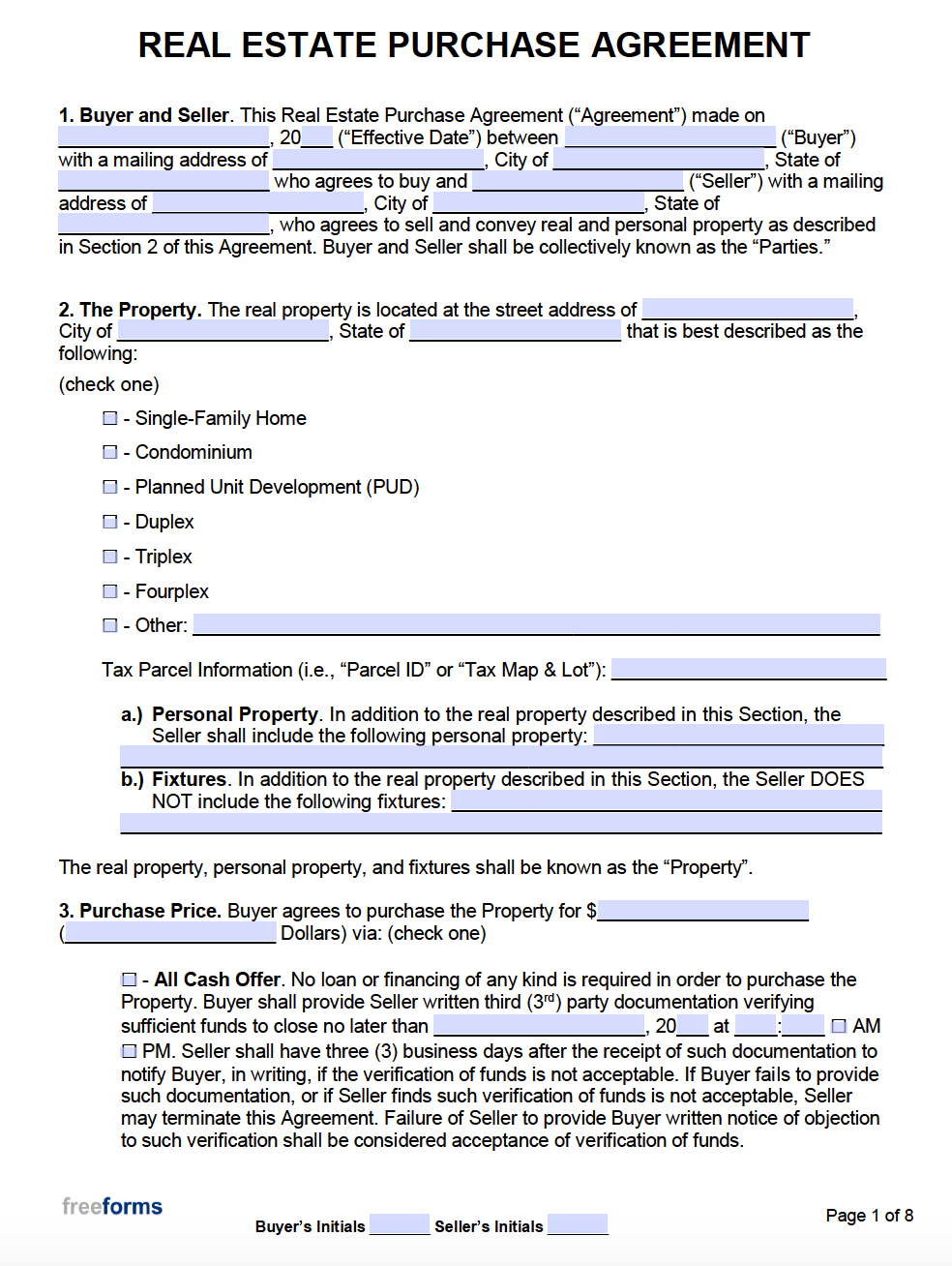
A real estate purchase agreement is an instrument that is employed when individuals partake in the purchase & sale of a residential dwelling. This can be applicable to a single-family house, condo (or another type of common-interest community property), duplex, etc. Once a buyer shows interest in a residence for sale, they will submit an offer in the form of this agreement. Listed within the content of the agreement is the prospective buyer’s desired contractual terms, such as their proposed purchase price, provisional requests, protective contingencies, and the amount of earnest money they are willing to deposit. The seller will typically be given a time limit to either accept, deny or counteroffer the submission. If accepted, the seller shall sign the offer creating a binding purchase agreement that will start the process of transferring the property. Otherwise, they may counter with an alternative proposition that includes the terms that they are more comfortable with (also using this very agreement).
Once a purchase agreement for the sale of residential property has been signed and is in escrow, participants are legally bound to uphold the commitments registered within the form. If the seller has a change of heart and would like to back out of the agreement, they may have some options to do so:
If the seller is unable to lawfully withdraw from the contract and still refuses to continue with the sale, they can face legal consequences and be held liable to compensate the buyer for an array of damages.
A contingency is essentially a clause within the contract that stipulates that if a certain requirement is not met, then the contract is void or open to further negotiations. These contingencies can be directly inserted within the content of the purchase agreement or attached to the contract in the form of an addendum. When creating your purchase agreement/offer, it is important to include any contingencies that will provide security for the transaction. Listed below are some of the more customary contingencies that buyers/sellers will want to include within the purchase agreement:
An addendum is an additional form that can be attached to the purchase agreement. It can provide supplementary terms to the contract that either alter the course of the previously arranged agreement or simply just add to it at the time of its inception. As mentioned in the previous section, a contingency can come in the form of an addendum. Here are several different types of addendums that can be implemented, some of which incorporate the common contingencies listed above:
A lot of people use the terms “Realtor” and “real estate agent” interchangeably and do not realize that they are not technically the same. Read the descriptions below to better understand the key differences between the two.
A real estate agent is an individual who has completed the required salesperson course for their state (this course will vary in the number of hours needed to pass depending on the state). After passing the course, they are instructed to take the mandatory state exam in order to demonstrate that they have sufficient knowledge of the local real estate laws and protocol. They must then join an agency that is overseen by a broker in order to legally serve clients who seek assistance with their selling or purchasing needs.
A Realtor is someone who has fulfilled all the requirements needed to become a licensed real estate agent and is also affiliated with the National Association of REALTORS®. Becoming a member of this organization means that you are held to a higher standard than your average salesperson, as you have to follow a certain code of ethics that is enforced by the association. In short, it is an extra credential that further legitimizes the agent and grants them access to the group’s various resources that can help facilitate a sale.
As most homeowners looking to sell their property are busy with their careers, families, and other obligations, they do not have the time nor the experience/knowledge to sell their own property by themselves. Luckily, there are agents who specialize in the sale of residential real estate who can help ease the process and maximize your final proceeds. A listing agent can perform the following tasks:
But you can’t just hire anybody who has a license, you are going to want to recruit an agent who is qualified and has valuable knowledge of the area your property is located in. This means that you should avoid hiring someone who just recently acquired their license because they are a friend or family member. Begin the process by:
Researching Local Agents – Find out who the available agents are in your area by:
Reviewing Their Record – When deciding whether or not you are going to sign with an agent, make sure that you first check their credentials. Try to verify the following info:
It is suggested that you interview a minimum of three (3) agents prior to entering into a listing agreement. Be cautious of hiring an agent who gives you a significantly higher estimate for the value of your home than other agents you’ve interviewed, they may just be trying to entice you to list with them.
“For Sale by Owner“, or FSBO, is the act of selling a residential property without the assistance of a realtor/real estate agent. Although the majority of home sellers enlist the help of a real estate agent, that does not mean selling a home on your own is an inconceivable task. It does, however, require a lot more time, research, and work for the seller (marketing your home can be a full-time job). When considering the idea of selling your property on your own versus with an agent, you should first assess the pros & cons associated with both approaches:
Benefits of selling your own property:
Disadvantages of selling your own property:
For the majority of the United States population, their home is their biggest asset. When a homeowner decides that they would like to sell their property, it can seem like a very intimidating task. Owners want to make sure they get top dollar for their property and hopefully even make a profit. So, it is important that before you put your dwelling on the market, you really reflect on whether or not you are truly ready to sell.
Whether you’re looking to sell your property because you would like to upgrade, downgrade, or relocate, this guide can help you take the necessary steps to sell your home without the assistance of a listing agent.

When preparing to sell your home, it is important to ensure that the property is presentable for public viewing. Here are some various ways you can make your property look more appealing to prospective buyers:
Administer a Deep-Cleaning – The first step should involve you making sure that the interior of the home is immaculate. This can be achieved by:
List the Various Damages/Deficiencies – Walk through the home and write down any noticeable flaws contained within the dwelling. Next, decide whether or not they are worth fixing for the purpose of improving the home’s appearance and potentially receiving more money from the sale. You don’t want to deter buyers from purchasing your home because of minor defects that could have easily been repaired. This could include:
Staging the Property – This is another common technique used in the real estate world that involves a professional coming in and enhancing the visual aesthetic of the home by outfitting the property with:
Enhancing the Curb Appeal – Once the inside is taken care of, you should improve the property’s external appearance by:
Now that your home is fully prepped for sale, you may want to consider having a professional conduct a:

The most important element when getting ready to put your property on the market is settling on an asking price. This measure requires research and a lot of consideration in order to sell your home in a timely manner. Some of the factors that contribute to a property’s value include:
Listed below are some of the methods used to price residential properties:
Think about the following questions when pricing your home:

In order to alert potential buyers of your available property, you must publicize it through the various avenues that are accessible today. To do so, you are going to want to execute the following checklist:
Take Photos – Once the property is in pristine order, you are going to want to capture quality pictures of the residence inside & out that highlight its best features. It is recommended that you hire a professional photographer who has all the necessary equipment and knowledge it takes to snap top-grade photos. A good real estate photographer can even create a virtual tour that allows online visitors a 360-degree view of the property’s interior layout. If you are looking to save money, you can make the decision to take the pictures yourself as long as you have a high-definition camera and the confidence in your abilities. But remember, this is the most significant element when promoting your property, as most people base their opinions on the property’s appearance in the photos.
Write a Description – It is important that you write a detailed summary that describes the home for sale and all its selling points. Take your time when crafting the description, as it will need to be included in every ad that you post. Be sure to include an enticing headline and your personal contact information so that interested parties can reach you. Details about the home that you may want to consider covering in your description include:
Display a “For Sale” Sign – Don’t underestimate the effectiveness of displaying a “For Sale by Owner” sign on the property, especially if the home is located in a high-traffic area. This is essentially free promotion as anybody passing by will be made aware that the property is on the market. Make sure that the sign is positioned in a way that is most visible to people commuting to their destination. Write your telephone number within the indicated area of the sign, making sure that the print is legible and easily seen from a distance. Not only will this inform passersby, but it can also help interested parties locate your property for showings. If you live in a common-interest community, you may want to refer to the association’s rules as to whether or not you are allowed to post a sign on the premises. (FSBO signs can be found at most home improvement stores and can vary in cost. You can also order online through websites such as Lowes.com.)
Post Online Ads – Now that you have taken care of the preliminary measures, it’s time to place your ads. In the earlier days of selling property, homeowners would have to advertise their residence in a local newspaper or magazine. Thanks to the internet, it is much easier for sellers to market their own home without the assistance of a real estate agent. There are various websites fully dedicated to promoting homes for sale, the top sites being:
The following sites listed below completely focus on the buying and selling of FSBO properties:
In order to post ads, you are first going to need to create an account for each website. Once you have signed up, upload the photos of your property and insert the written description that you produced earlier within the corresponding text boxes. You may then publish the ad once you feel it is ready to be presented to the public. Congratulations! Your property is now displayed on a prominent home sales website. Now it’s time to sit back and await responses. (It also doesn’t hurt to inform friends, acquaintances, and family members of your available property by posting on your various social media accounts, e.g. Facebook.com.)
Unfortunately, FSBO sellers are unable to directly advertise on MLS.com and Realtor.com, which are popular websites reserved for properties that are listed with licensed real estate agents. But, if interested, there are several third-party companies available online that can list your property for you on the aforementioned websites for a fee.

Now that you have publicized your property for sale, you will begin to receive inquiries. It is imperative that you keep track of your email and answer/return all incoming phone calls. People will be contacting you asking various questions concerning the home and eventually request to view the property. Showing your home can be a bit of a hassle, especially when you have other family members in and out of the dwelling. But, it is important to realize that the more people who view the home, the more chance of you receiving an offer. Follow the guidelines listed below to enhance the quality of your showings:
Prepare Your Home for Viewing – As you already took the necessary steps to improve your home’s appearance when prepping it for the marketplace, all you will have to do now is maintain its presentability for showings. This means you must:
Private Showings – This occurs when a private party requests to view the property by appointment. The appointment can be made in advance or sprung upon you at the last second. This is why it is important that the seller:
Open House Showings – An open house is when a property is available for anyone to walk in and view the home within a specified time period. Some people question the effectiveness of this practice and don’t find it necessary to frequently conduct them. Others believe that they are productive and insist on carrying one out every other week. Ultimately, the choice is yours as to how often you would like to incorporate this tradition. If interested, sellers should strongly consider:
Create a Comfortable Environment for your Guests – As interested parties approach to view your home, whether it be a private or open house showing, it is important that you make them feel welcome. You can start by:
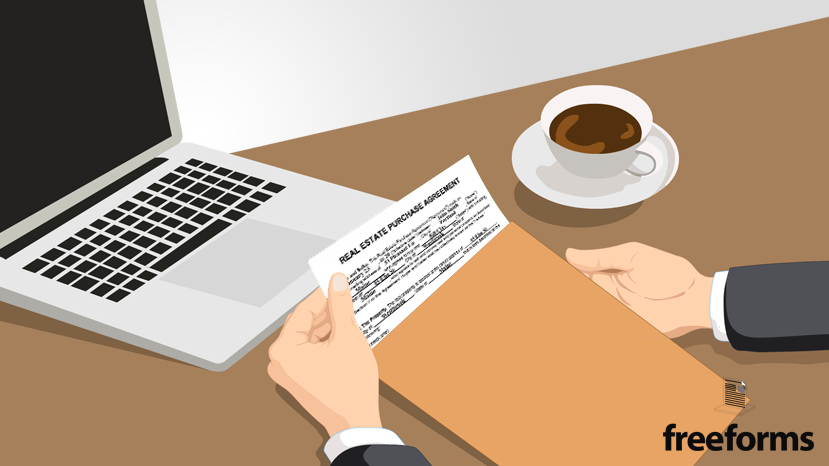
Hopefully, after showing your property to various parties, you will receive an offer from a prospective buyer looking to acquire the dwelling. This offer will come in the form of a purchase agreement that encompasses their desired terms. The seller should then review the listed terms and decide whether they agree to the conditions or not. If not, they may simply decline the offer altogether or submit a counteroffer expressing their demands. If they accept the terms provided, they can sign the offer converting it to a binding contract. Sellers should favor buyers who offer the following:
Letter of Pre-Approval – Is documentation distributed by a mortgage company validating the buyer’s ability to acquire financing. It can be a big waste of time and effort to enter into a sales contract with a buyer, only to find out later that they can’t even fund the purchase.
Earnest Money Deposit – This demonstrates that the party offering to purchase your home is serious and capable of buying the property. The amount usually ranges from 1-5% of the total sale price and later goes towards the purchaser’s down payment once the transaction is approved. The buyer will normally protect themselves with certain contingencies that ensure that the money is returned if the exchange doesn’t occur. But if the buyer decides to back out for any reason that is not safeguarded by a contingency, the seller may have the right to retain the funds held in escrow.
Cash Offer – When someone offers to purchase the home in cash without borrowing the money. This is considered more favorable to the seller because it takes less time to close on the property, as opposed to a transaction that involves a buyer who has to obtain financing from a loan company.
Some other considerations that the seller should think about when negotiating offers include:
Making Concessions – If the owner is really motivated to make a sale work, whether they aren’t receiving many offers, are in dire need of the money, or are looking to relocate by a certain date, they can offer the buyer certain incentives that will entice them to follow through with the exchange. Some concessions that might influence the buyer to carry out the deal include:
Owner Financing – This is when the seller acts as the lender and accepts payments from the purchasing party instead of them borrowing money from the bank. If both parties can come to an agreement on the terms of the loan, they must then execute a promissory note to be filed into the public record. Some of the benefits of owner/seller financing include:

After signing the offer, both parties will be required, by law, to follow through with the contractual obligations contained within the form. All federal & state regulations concerning the transfer of residential property must also be complied with in order to lawfully execute the sale. The rules can vary from state to state but sellers nationwide should always be prepared to supply the following:
Property Disclosure Form – Upon the acceptance of an offer, the seller is typically compelled, by law (depending on the state), to provide the buyer with a disclosure form giving an overview of the property’s current condition and indicate whether or not there are any adverse defects present within the home. Even if not required by the state’s law, this is commonly requested by prospective buyers in order to proceed with any type of transaction.
Lead-Based Paint Disclosure Form – No matter what state the sale is taking place in, the seller of a property built before 1978 is required to deliver this disclosure form to the buyer according to federal law.
Also, just because the home is now under contract, doesn’t mean that the sale is guaranteed to go through. In order to maintain the obligated terms of the contract, the buyer and seller must adhere to all the conditions made within the agreement. A few of the most common factors that can contribute to a delay in the closing process are:
Appraisal – Any findings that indicate that the property is worth less than the purchase price can halt the proceedings and require adjustments to be made to the agreement.
Financing – When a buyer is relying on a financial institution to provide the funds needed to purchase the home, it can sometimes go awry. If they have not been pre-approved, they may be notified during the course of the agreement that they do not meet the standards necessary to secure the loan. Actually, this can sometimes happen even if they were pre-approved, as the bank has the right to alter their decision if they receive any information during the process that indicates that the buyer is not qualified to obtain financing.
Inspection – If there is a major issue identified during the inspection, the buyer has carte blanche to terminate the contract unless the seller facilitates the issue by either incurring the cost of having a professional repair the issue or subtracting the cost of the repair from the purchase price. This could potentially prolong the amount of time it will take to reach the closing.
Title – Another element that can postpone a closing date is an issue with the property’s title. Most buyers will have a title search conducted while under contract to ensure that it is free and clear of any encumbrances. Complications that can be linked to the title include:

As you approach the closing date, it is important that you start to coordinate your move out of the property. You can start by:
Moving Your Belongings Out of the Home – Sellers should have all items that are not included in the sale removed from the property at least twenty-four (24) hours before the buyer’s scheduled move-in date. Prepare in advance by:
Cleaning the Property – After the home is emptied, it is considered common courtesy to give it one final cleaning. In fact, it is not uncommon for a seller to pay a professional cleaning company to come in and service the property prior to closing. Just make sure to:
Canceling Services Registered Under Your Name – On the days following up to your move-out date, contact any companies that currently provide services to the home and have them canceled or transferred to your new residence. Some services that you may want to adjust include:
Secure the Property – Once you feel that the property is fully prepared to be transferred over to the new owner and you are ready to leave, it is vital that you properly close down the home. Ensure that the following tasks occur:
Final Walk-Through – Grant the buyer access to the property within twenty-four (24) hours of the closing. This allows them to examine the property one last time before finalizing the transaction, giving them the chance to verify that the property is as it should be.

Finally, the day has arrived where you will be officially closing on your property. This will usually take place at the title/escrow company’s office where you will be executing all the final paperwork that is necessary to formally conclude the sale. It is important that you bring the following materials:
Signing the Closing Documents – Since you are selling your own home and do not have a listing agent assisting you with the presented documentation, it is important that you take your time and thoroughly read each form. If there are any sections that you are unsure of, ask the closing/escrow agent present (or attorney, if applicable) to clarify the information provided. Once you have a full understanding of all the paperwork distributed, you may sign the following documents within the designated areas to complete the process:
Receiving the Net Proceeds of the Sale – Congratulations! You may now collect your money from the title/escrow company. But keep in mind, all the money you receive from the sale will not directly go into your pocket. You must deduct:
This will all be arranged by the title/escrow company at the time of closing, who will then give you a full breakdown of all the charges imposed. Whatever is left over is yours, whether it goes towards a new home or into your bank account.
Step 1 – Download the document in Adobe PDF or Microsoft Word (.docx).
Step 2 – Identifying the Buyer & Seller – Fulfill the first section of the form regarding the participating parties by entering the following information:

Step 3 – Identifying the Property for Sale – Next, you are going to want to describe the property that is being sold/purchased by inputting:
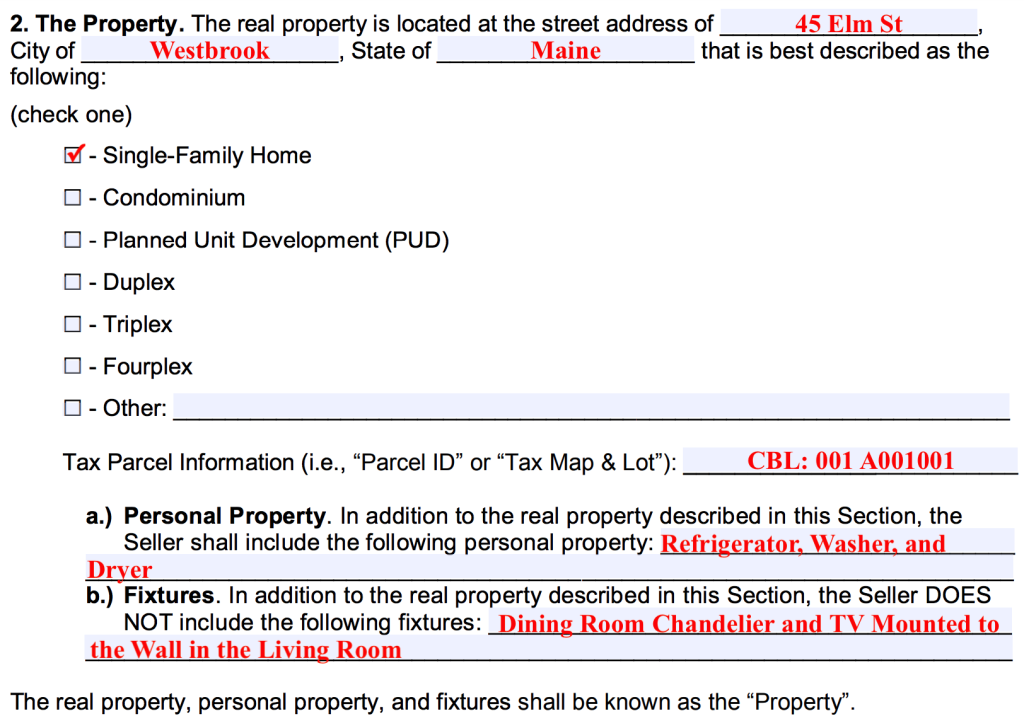
Step 4 – Stipulating the Purchase Price & Method of Funding – In the top portion of this section, enter the proposed purchase price into the corresponding spaces (in numerical and written form). Once the purchase price has been established, select how the buyer will supply the funding for the acquisition. They have the following options:

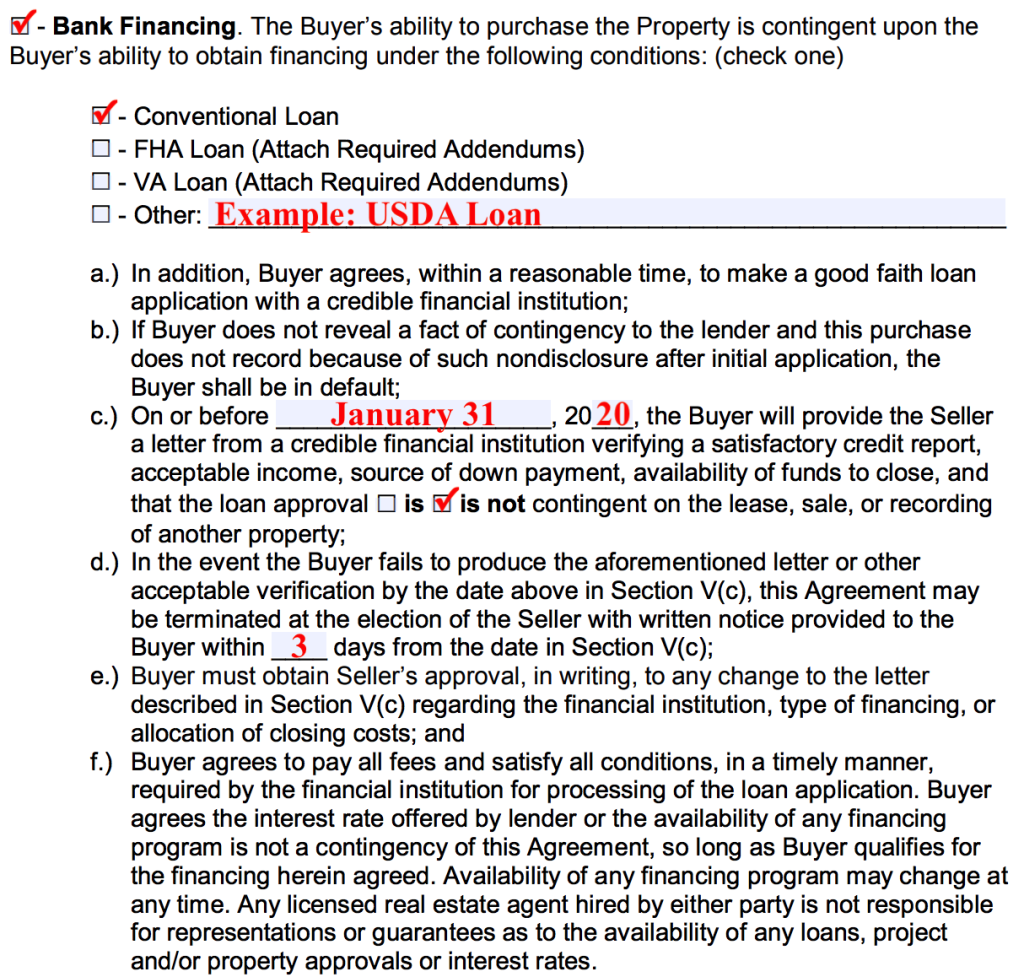
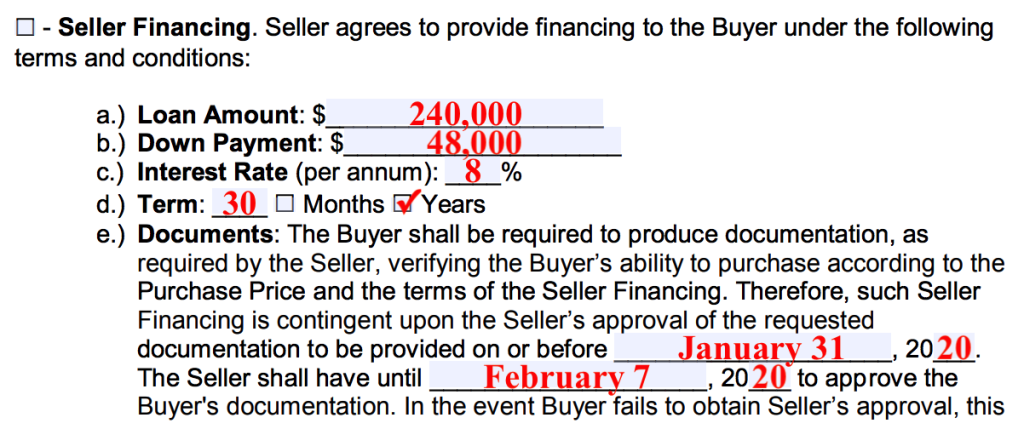
Step 5 – Earnest Money/Sale of Another Property Contingency/Closing Costs – Determine the following aspects of the sale:
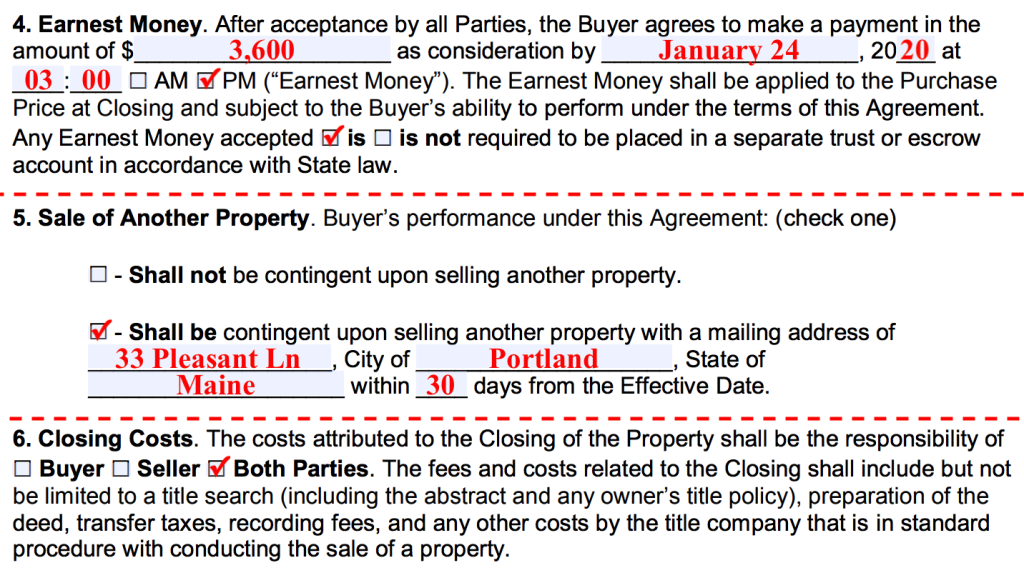
Step 6 – Closing & Survey Details – The following sections require the individual filling out the form to define the following terms:
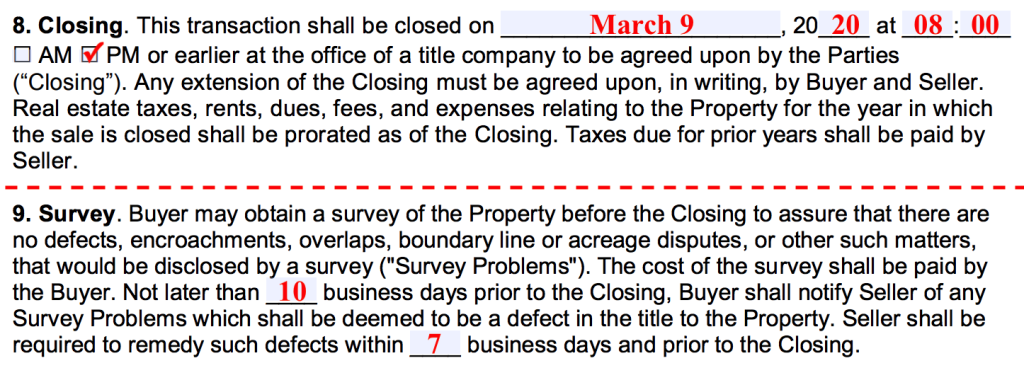
Step 7 – Title – In regard to the “Title Search Report”, the party supplying the information to the form should:
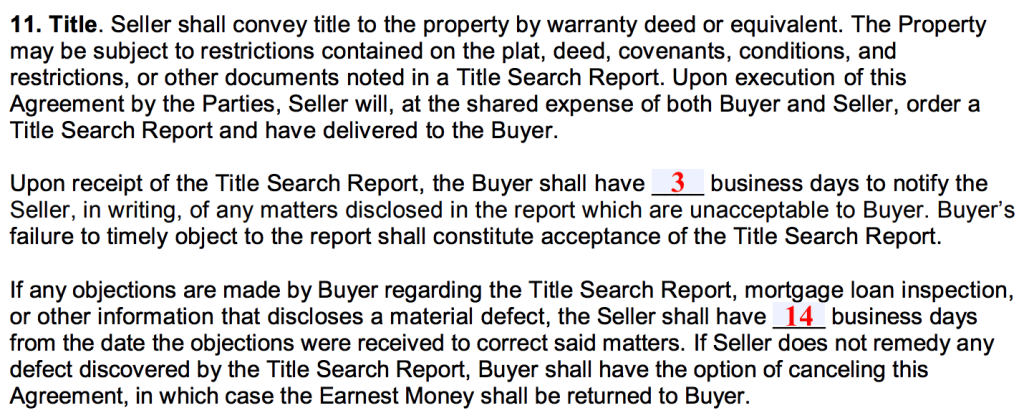
Step 8 – Property Condition – This portion of the agreement essentially states that the seller agrees to maintain the current condition of the home until the time of the sale and that the buyer has the right to hire a licensed inspector to further investigate the property. The following conditions should be recorded concerning the inspection:
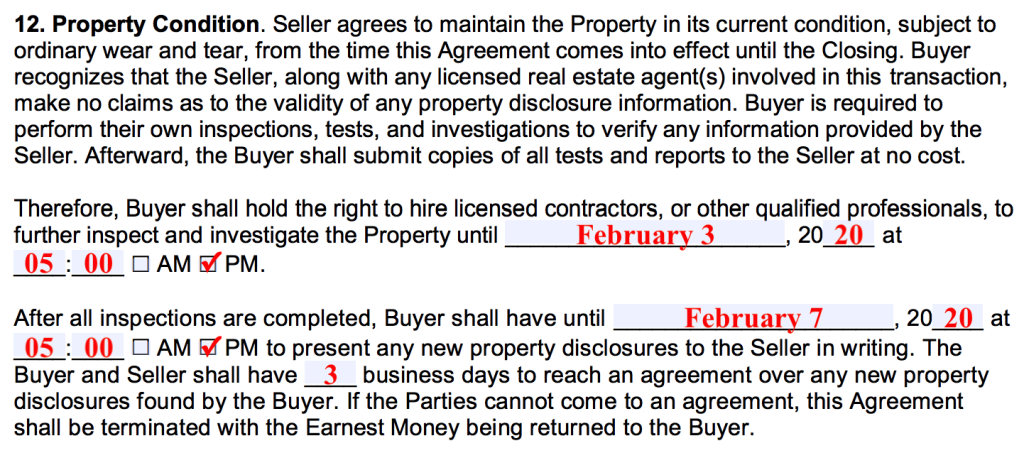
Step 9 – Appraisal & Termination – Outline the requirements associated with the following components of the sale:
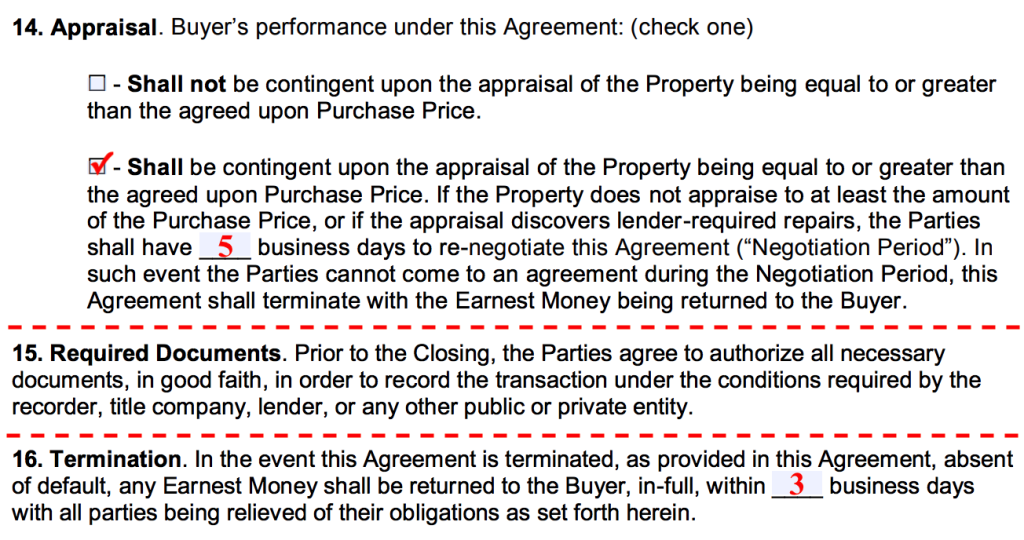
Step 10 – Governing Law – This portion of the form just simply requests that the user provide the name of the state where the sale is taking place and whose laws govern any local real estate transactions.

Step 11 – Offer Expiration – Set a date & time from the effective date of the contract in which the receiving party has to accept the agreement and sign it. If the time limit is exceeded, the offer will expire and is no longer valid.

Step 12 – Disclosures and Additional Terms & Conditions – The final two (2) sections regarding the terms of the contract request that you cover the following areas of the agreement:
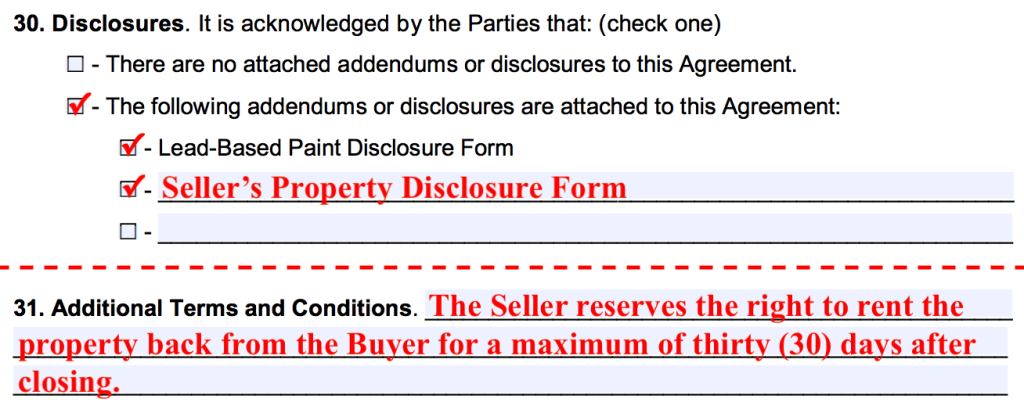
Step 13 – Signatures – The final portion of the agreement requires all participating parties to supply the following:

Once all the above fields have been executed, the document will become a binding purchase agreement that is enforceable by law.